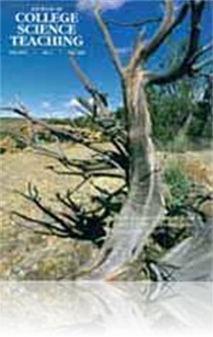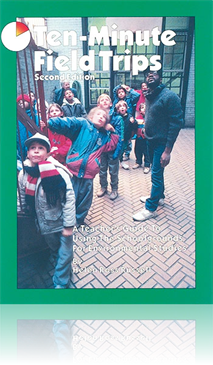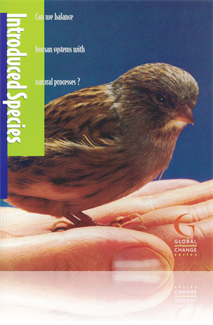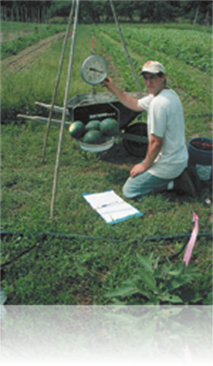All Resources
Journal Article
This column provides original articles on innovations in case study teaching, assessment of the method, as well as case studies with teaching notes. In this month’s issue, the author, while approaching the problem of categorizing types of case stu...
Journal Article
The results of a survey revealed that astronomy workshops are necessary because of the lack of astronomy education in schools. In this article, The Oklahoma Project (TOP) Astronomy held a workshop with earth and physical science teachers of various g...
Journal Article
This article discusses the structure, content, and implementation of a new course designed to teach the crucial essentials of the scientific enterprise to the nonscience major. The focus is the attempt to teach the process of science, the "doing" of ...
Journal Article
Students can have positive experiences in college chemistry despite underdeveloped study habits by taking advantage of the resources available to help them study and prepare for courses. This article describes how Wayne State University motivated at-...
Journal Article
Editorial: Cures, Risks, and Human Rights in America
The Journal of College Science Teaching’s editor shares thoughts regarding the current issue....
Journal Article
This column shares reflections or thoughtful opinions on issues of broad interest to the community. This month’s issue shares thoughts about the place of the computer in biology education....
Journal Article
At the entry level, clear and effective writing is essential to the teaching, learning, dissemination, and progress of science. Improvement in writing occurs largely through individual effort, practice, and feedback. The goal of this course is to hel...
Journal Article
This experimental program at the University of Wyoming was designed to produce teachers who have a solid foundation in science content and a realistic view of science and technology. They should be competent in designing and implementing science in...
eBook
Ten-Minute Field Trips (e-book)
You don't have to go far to get science out of the classroom. An NSTA best-seller, this book is ideal for teachers in all school environments--urban, suburban, or rural. Renowned educator Helen Ross Russell describes more than 200 short, close-to-hom...
NSTA Press Book
Ten-Minute Field Trips: A Teachers's Guide to Using the Schoolgrounds for Environmental Studies
You don't have to go far to get science out of the classroom. An NSTA best-seller, this book is ideal for teachers in all school environments--urban, suburban, or rural. Renowned educator Helen Ross Russell describes more than 200 short, close-to-hom...
By Helen Ross Russell
NSTA Press Book
Global Environmental Change: Introduced Species
Human activity has introduced species to ecosystems around the globe. Some species are benign or even beneficial; others, like zebra mussels, fire ants, and water hyacinths, are causing native species extinctions and damage to human systems. Can we b...
By Environmental Protection Agency , NSTA Press
Journal Article
This introductory cell physiology course for majors encourages them to experience the scientific way of knowing. The article stresses the importance of elevating the perception of students' capabilities and allowing them to discover their own way of ...
Journal Article
Point of View: Miles Pickering—A Bibliography—A Chemistry Educator's Legacy
This column shares reflections or thoughtful opinions on issues of broad interest to the community. This month’s issue features a bibliography of Miles Pickering, a Princeton University chemistry department lecturer and senior staff member....
Journal Article
This freshman core program in mathematics and science was developed at Bloomfield College, and revised and implemened at Lehman College. This learning is a joint venture—the student must be an active participant and work through perhaps one of the ...
Journal Article
This column provides original articles on innovations in case study teaching, assessment of the method, as well as case studies with teaching notes. This month’s issue concludes that a "good case" tells a short story with focus on a current, intere...
Journal Article
Editorial: Bright Light in Encinitas
The Journal of College Science Teaching’s editor shares thoughts regarding the current issue....
Journal Article
What turned these kids on is an investigative approach—where they could do the thinking. Although the advantages of investigative laboratories have already been documented, this report is unique because it focuses on changing faculty perspectives ...
Journal Article
There are several topics that give students concern, but evolution is the most troubling subject area covered in biology courses. The purpose of this study is to assess the students' understanding and acceptance of the credibility of the scientific e...
Journal Article
The California State University campus at San Marcos introduced a new teaching model, CPAE (Content-Process-Application-Evaluation), to improve science teacher education. This article helps to understand how the CPAE approach effectively overcomes m...
Journal Article
In this column the leadership of SCST shares its views with JCST readers. This month’s issue features a new book, Methods of Effective Teaching and Course Management, an excellent resource for college and university teachers committed to reform an...
Journal Article
On the Road to Damascus—Technology, Fear, and Fear of Technology
Computer and computer technology have become a revolutionary force for reshaping both society and education at all levels. This revolution is taking place in both the developed and developing world with far-reaching consequences....
Journal Article
In this column the leadership of SCST shares its views with JCST readers. In this month's issue find out the importance of submitting program proposals almost a full year in advance of a convention....
Journal Article
Our nation is experiencing a general trend of declining enrollments in mathematics and science majors study tracks. The U.S. Naval Academy (USNA) Oceanography major is "bucking this trend" with a combination of non-traditional appraches that can be a...








